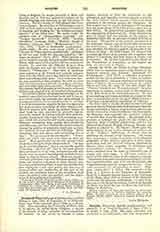

Jacquier, FRANCOIS, French mathematician and physicist, b. at Vitry-le-Francois, June 7, 1711; d. at Rome, July 3, 1788. His early education was entrusted to an ecclesiastic, who soon recognized in him an inclination to science and mathematics, and endeavored to cultivate it. When sixteen years old, Francois entered the Order of Friars Minor, and after profession was sent to Rome, to complete his studies in the French convent of the order, La Trinite du Mont. With the permission of his superiors he specialized in mathematics, and at the same time, as a sort of mental diversion, devoted himself to the study of the ancient languages. He became very proficient in Hebrew, and spoke Greek as though it were his mother-tongue. His labors and learning gained for him the patronage of Cardinals Alberoni and Portocarrero. He accompanied Cardinal Alberoni on his legation to Ravenna, and was appointed to inspect the work begun by Manfredi to prevent the repeated inundations of that territory. On his return he was given the chair of Sacred Scripture at the College of the Propaganda, and was also detailed by the general chapter of the Friars Minor, assembled at Marseilles, to work upon the annals of the order. The King of Sardinia named him professor of physics at the University of Turin in 1745, but Cardinal Valenti, prime minister of Benedict XIV, eager to retain so learned a man in Rome, had him assigned to the chair of experimental physics at the Roman College. Here he was in continual demand for consultation upon scientific matters. In 1763 he was appointed instructor in physics and mathematics to the young Prince Ferdinand at Parma. He was appointed in 1773 to the chair of mathematics at the Roman College, on the occasion of the suppression of the Jesuits. At his death he was connected with nearly all the great scientific and literary societies of Europe. The most important of his works are: (I) “Isaaci Newtoni philosophiae naturalis principia mathematica, perpetuis commentariis illustrata (4 parts in 3 vols. 4to, Geneva, 1739-42), in collaboration with P. Lesueur; (2) “Parere e riflessioni sopra i danni della cuppola di San-Pietro” (4to, Rome, 1743); (3) “Elementi di perspettiva secondo i principi di Taylor” (8vo, Rome, 1745); (4) “Institutiones Philosophicae ad studia theologica potissimum accommodata” (6 vols. in 12mo, Rome, 1757), reprinted many times at Rome, Venice, and in Germany, and later translated into Spanish; (5) “Elements du calcul integral” (4to, Parma, 1768), a work highly esteemed and more complete than any that had been published up to that time.
E. P. TIVNAN

